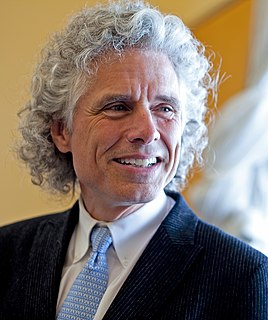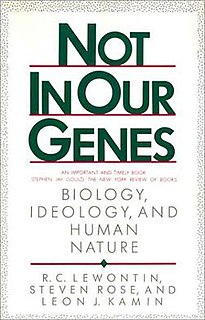
Evolutionary psychology is a theoretical approach in the social and natural sciences that examines psychological structure from a modern evolutionary perspective. It seeks to identify which human psychological traits are evolved adaptations – that is, the functional products of natural selection or sexual selection in human evolution. Adaptationist thinking about physiological mechanisms, such as the heart, lungs, and immune system, is common in evolutionary biology. Some evolutionary psychologists apply the same thinking to psychology, arguing that the modularity of mind is similar to that of the body and with different modular adaptations serving different functions. These evolutionary psychologists argue that much of human behavior is the output of psychological adaptations that evolved to solve recurrent problems in human ancestral environments.

Steven Arthur Pinker is a Canadian-American cognitive psychologist, linguist, and popular science author. He is an advocate of evolutionary psychology and the computational theory of mind.
Evolutionary economics is part of mainstream economics as well as a heterodox school of economic thought that is inspired by evolutionary biology. Much like mainstream economics, it stresses complex interdependencies, competition, growth, structural change, and resource constraints but differs in the approaches which are used to analyze these phenomena.

Economic geography is the subfield of human geography which studies economic activity. It can also be considered a subfield or method in economics.
Pascal Robert Boyer is a French-American cognitive anthropologist and evolutionary psychologist, mostly known for his work in the cognitive science of religion. He taught at the University of Cambridge for eight years, before taking up the position of Henry Luce Professor of Individual and Collective Memory at Washington University in St. Louis, where he teaches classes on evolutionary psychology and anthropology. He was a Guggenheim Fellow and a visiting professor at the University of California, Santa Barbara and the University of Lyon, France. He studied philosophy and anthropology at University of Paris and Cambridge, with Jack Goody, working on memory constraints on the transmission of oral literature.

The Blank Slate: The Modern Denial of Human Nature is a best-selling 2002 book by the cognitive psychologist Steven Pinker, in which the author makes a case against tabula rasa models in the social sciences, arguing that human behavior is substantially shaped by evolutionary psychological adaptations. The book was nominated for the 2003 Aventis Prizes and was a finalist for the Pulitzer Prize.

Nonzero: The Logic of Human Destiny is a 1999 book by Robert Wright, in which the author argues that biological evolution and cultural evolution are shaped and directed first and foremost by "non-zero-sumness" i.e., the prospect of creating new interactions that are not zero-sum.

Not in Our Genes: Biology, Ideology and Human Nature is a 1984 book by the evolutionary geneticist Richard Lewontin, the neurobiologist Steven Rose, and the psychologist Leon Kamin, in which the authors criticize sociobiology and genetic determinism and advocate a socialist society.
The term standard social science model (SSSM) was first introduced by John Tooby and Leda Cosmides in the 1992 edited volume The Adapted Mind. They used SSSM as a reference to social science philosophies related to the blank slate, relativism, social constructionism, and cultural determinism. They argue that those philosophies, capsulized within SSSM, formed the dominant theoretical paradigm in the development of the social sciences during the 20th century. According to their proposed SSSM paradigm, the mind is a general-purpose cognitive device shaped almost entirely by culture.

The Adapted Mind: Evolutionary Psychology and the Generation of Culture is a 1992 book edited by the anthropologists Jerome H. Barkow and John Tooby and the psychologist Leda Cosmides. First published by Oxford University Press, it is widely considered the foundational text of evolutionary psychology (EP), and outlines Cosmides and Tooby's integration of concepts from evolutionary biology and cognitive psychology, as well as many other concepts that would become important in adaptationist research.
Evolutionary educational psychology is the study of the relation between inherent folk knowledge and abilities and accompanying inferential and attributional biases as these influence academic learning in evolutionarily novel cultural contexts, such as schools and the industrial workplace. The fundamental premises and principles of this discipline are presented below.
A cultural universal, as discussed by Emile Durkheim, George Murdock, Claude Lévi-Strauss, Donald Brown and others, is an element, pattern, trait, or institution that is common to all human cultures worldwide. Taken together, the whole body of cultural universals is known as the human condition. Evolutionary psychologists hold that behaviors or traits that occur universally in all cultures are good candidates for evolutionary adaptations. Some anthropological and sociological theorists that take a cultural relativist perspective may deny the existence of cultural universals: the extent to which these universals are "cultural" in the narrow sense, or in fact biologically inherited behavior is an issue of "nature versus nurture".
Complexity economics is the application of complexity science to the problems of economics. It sees the economy not as a system in equilibrium, but as one in motion, perpetually constructing itself anew. It uses computational and mathematical analysis to explore how economic structure is formed and reformed, in continuous interaction with the adaptive behavior of the 'agents' in the economy.
Evolutionary psychology has generated significant controversy and criticism. The criticism includes: disputes about the testability of evolutionary hypotheses, alternatives to some of the cognitive assumptions frequently employed in evolutionary psychology, alleged vagueness stemming from evolutionary assumptions, differing stress on the importance of non-genetic and non-adaptive explanations, and political and ethical issues.
The evolutionary psychology of religion is the study of religious belief using evolutionary psychology principles. It is one approach to the psychology of religion. As with all other organs and organ functions, the brain's functional structure is argued to have a genetic basis, and is therefore subject to the effects of natural selection and evolution. Evolutionary psychologists seek to understand cognitive processes, religion in this case, by understanding the survival and reproductive functions they might serve.
Some of the research that is conducted in the field of psychology is more "fundamental" than the research conducted in the applied psychological disciplines, and does not necessarily have a direct application. The subdisciplines within psychology that can be thought to reflect a basic-science orientation include biological psychology, cognitive psychology, neuropsychology, and so on. Research in these subdisciplines is characterized by methodological rigor. The concern of psychology as a basic science is in understanding the laws and processes that underlie behavior, cognition, and emotion. Psychology as a basic science provides a foundation for applied psychology. Applied psychology, by contrast, involves the application of psychological principles and theories yielded up by the basic psychological sciences; these applications are aimed at overcoming problems or promoting well-being in areas such as mental and physical health and education.
The history of evolutionary psychology began with Charles Darwin, who said that humans have social instincts that evolved by natural selection. Darwin's work inspired later psychologists such as William James and Sigmund Freud but for most of the 20th century psychologists focused more on behaviorism and proximate explanations for human behavior. E. O. Wilson's landmark 1975 book, Sociobiology, synthesized recent theoretical advances in evolutionary theory to explain social behavior in animals, including humans. Jerome Barkow, Leda Cosmides and John Tooby popularized the term "evolutionary psychology" in their 1992 book The Adapted Mind: Evolutionary Psychology and The Generation of Culture. Like sociobiology before it, evolutionary psychology has been embroiled in controversy, but evolutionary psychologists see their field as gaining increased acceptance overall.
Cognitive bias mitigation is the prevention and reduction of the negative effects of cognitive biases – unconscious, automatic influences on human judgment and decision making that reliably produce reasoning errors.
Evolutionary psychology of language is the study of the evolutionary history of language as a psychological faculty within the discipline of evolutionary psychology. It makes the assumption that language is the result of a Darwinian adaptation.
Zero-sum thinking perceives situations as zero-sum games, where one person's gain would be another's loss. The term is derived from game theory. However, unlike the game theory concept, zero-sum thinking refers to a psychological construct—a person's subjective interpretation of a situation. Zero-sum thinking is captured by the saying "your gain is my loss". Rozycka-Tran et al. (2015) defined zero-sum thinking as:
A general belief system about the antagonistic nature of social relations, shared by people in a society or culture and based on the implicit assumption that a finite amount of goods exists in the world, in which one person's winning makes others the losers, and vice versa ... a relatively permanent and general conviction that social relations are like a zero-sum game. People who share this conviction believe that success, especially economic success, is possible only at the expense of other people's failures.






